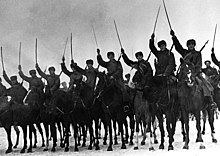| 1st Guards Cavalry Corps | |
|---|---|
 | |
| Active | 1941 – July 1946 |
| Country | |
| Branch | Cavalry |
| Type | Mobile unit |
| Size | 18,000 |
| Nickname(s) | Fire squad |
| Engagements | World War Two
|
| Battle honours | Zhytomyr |
| Commanders | |
| Notable commanders | |
1st Guards Cavalry Zhytomyr Red Banner Corps (Russian: 1-й гвардейский кавалерийский Житомирский Краснознаменный корпус) was a military unit of the Soviet Red Army which was renamed from the 2nd Cavalry Corps. Led by Pavel Belov it was involved in several colossal combat operations during the Great Patriotic War, with its most stupendous accomplishments seen during the Battle of Moscow.
Despite being a cavalry unit, the guards have a long and robust history of successful warfare among all allied units. The cavalry men proved themselves as valuable units from the early days of Operation Barbarossa until the last days of the war. Belov's group was the first major formation to successfully push the Germans back during the counter-offensive of the Battle of Moscow. By 1942, the unit had its reputation as the "Fire Squad" from Stalin himself. During the Battle of Rzhev-Vyazma the Cavalry Corps was among the few units to break through the German lines, leaving most of the heavy weapons behind. As a result, despite many difficulties, they achieved the longest successful raid of the Second World War, surpassing the besieged 62nd Army (Soviet Union) at Stalingrad.
By the second half of the war, the cavalrymen who often spearheaded the front of the 1st Ukrainian Front were able to make even more significant breakthroughs behind enemy lines using the advanced Cavalry mechanized group, which resulted in a faster enemy line collapse. In January 1945, the guards who at the time fought with the 60th Army helped in its liberation of Auschwitz. After continuing its drive towards Berlin it was redirected south, liberating Dresden. The 1st Cavalry Corps met with the Americans on the Elbe River in late April 1945. By the end of the war just the 2nd Guards Cavalry division, which by then counted eighteen Heroes of the Soviet Union, liberated two camps and taken over 16,000 German prisoners along with much equipment over the month of April. Their commander Mamsurov, Hadji-Umar Dzhiorovich, for his accomplishments in the war, would participate in the Moscow Victory Parade of 1945. By the end of the war, the guards became one of the most decorated and accomplished units of the Red Army.